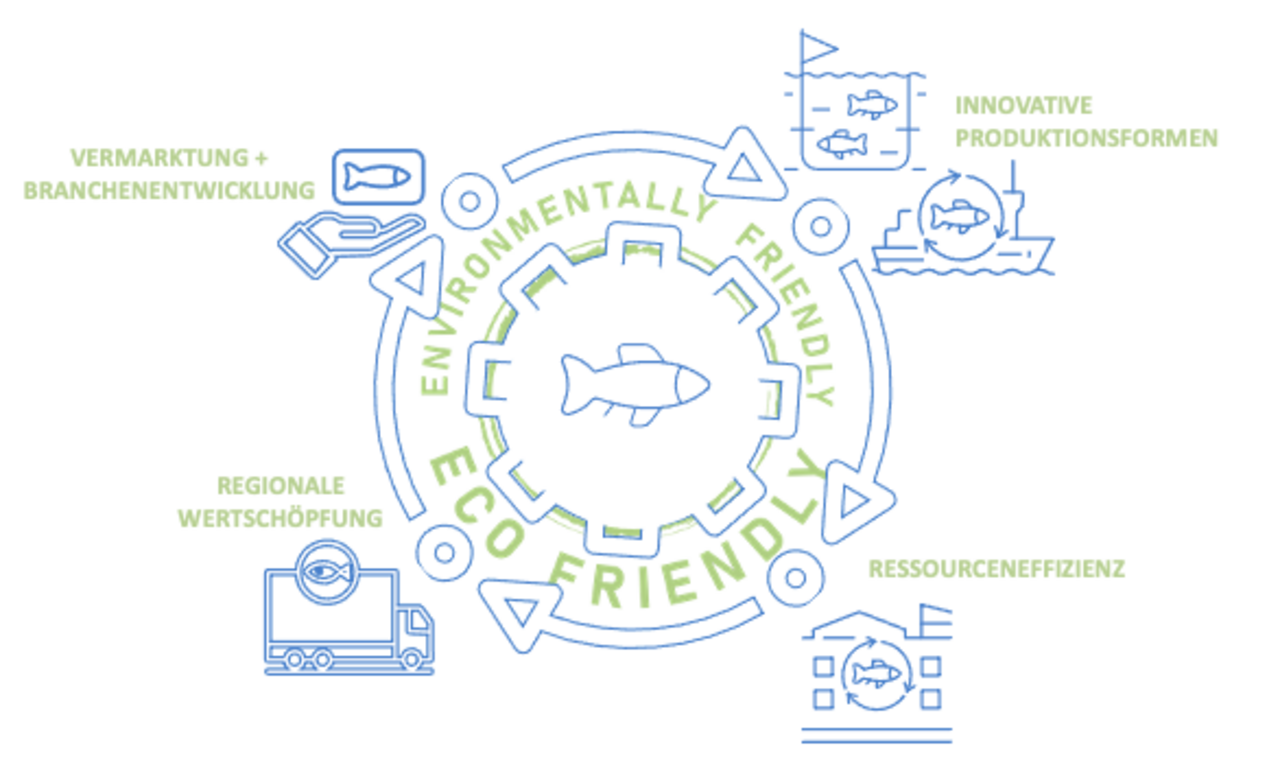Project
Re-Inventing aquatic production systems

Social and bioeconomic analyses in the fishing industry
The sector with the highest employment and turnover in the fish and seafood industry is the processing industry and wholesale. The majority of German fish catches already come from few high sea vessels and the vast majority of domestic consumption is imported. Which environmentally friendly production systems of fish and seafood will still pay off in Germany in the future and what structural change potentials are there? This is our guiding question, which we address in inter- and transdisciplinary cooperation between human and natural scientists as well as with environmental and business associations.
Background and Objective
Brexit, increasing competition for space with nature conservation and wind energy expansion, stricter environmental regulations, an outdated fleet (on average 30-40 years) and climate change result in a general low willingness to invest in the sector. In addition to fishing itself, the effects also extend to upstream and downstream industries in coastal regions. Small family businesses are particularly at risk. In order to improve the status of fragile marine habitats, the long-term sustainability of fish stocks and the economic resilience of local fishing communities, environmentally friendly fishing, production and processing methods are needed. For example, in the Norway lobster fishery, switching to passive fishing techniques is an option to market live-caught goods as a local and sustainable product. This allows fishers to charge local fishmongers, restaurants and consumers a higher price than they can currently gain for products fished with trawls.
In addition, the use of catching or production techniques that can safely coexist with offshore wind farms, other offshore developments and marine protected areas is becoming increasingly important as competition for space in the North Sea continues to increase.
We are investigating how a sustainable and yet profitable production could look like in Germany under changingconditions. Since most of the fish and seafood we consume is imported, we are also looking at how imports can be evaluated in terms of their sustainable production. For this purpose, a database on product developments is established and summary balance sheets and indicators are developed. The use and potential are recorded as well as the path of the goods to the broad spectrum of end users. Changes in the value chain as a result of future developments (e.g. dynamic technological developments) are taken into account. With the help of models, the understanding of systemic relationships and interactions is expanded.
Our aim is to investigate the economic feasibility of alternative production systems and development strategies in the fish and seafood industry. Our intention is to become concrete and to achieve noticeable changes in the system.
Target Group
Science, industry and politics
Approach
The focus of our work is on scientifically supported practical test runs together with companies as well as the subsequent analysis of the economic potential and possible marketing channels. Thereby the new and further development of bioeconomic models help us to calculate future scenarios and to assess their consequences for resources and users.
Our social and economic analyses can range from the regional to the international level and cover fisheries, aquaculture and fish processing across sectors. An ongoing collection of social and economic data of these sectors as well as a targeted processing of existing data form the basis of this work. For instance, based on the information obtained we assess costs, prices and competitiveness of alternative production systems.
Overall, we work across disciplines and with actors from industry, politics and environmental protection. We accompany and advise politicians and stakeholders in the fishing industry to make the sector sustainable and to put environmentally friendly solutions into practice.
Data and Methods
- Collection of economic and social data
- Methods of empirical social research, bioeconomic modelling, material flow analyses, sector analyses
Our Research Questions
- Which environmentally friendly production systems of fish and seafood will pay off in Germany in the future?
- What structural change potentials are there?
- What influence do natural, political, economic and technological framework conditions and their changes have on production?
- How do revenues, production costs and profitability develop in alternative forms of production?
- How much fish and seafood does Germany produce and how much of it is available to the German market?
- Where does our fish come from and under what conditions is it produced?
- Is one type of fish more sustainable than another? At which stages of the value chain can this be measured?
- How efficient is the German production of aquatic food?
- Is fish waste recycled in the best possible way in Germany?
Thünen-Contact

Involved Thünen-Partners
Duration
1.2020 - 12.2027
More Information
Project status:
ongoing

![[Translate to English:] [Translate to English:]](/media/_processed_/7/1/csm_IMG_7977_large_1defaf5de1.jpg)





